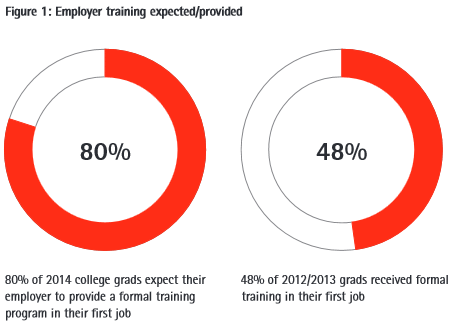Accenture’s 2014 College Graduate Employment Survey compares the expectations and perceptions of 2014’s university graduates with the realities of the working world according to both 2012 and 2013 graduates. This comparison casts a focused and specific lens on the issue of entry-level talent development, and gives us some insightful data. Accenture’s survey underlines that at the end of the day, many organizations are not effectively developing their entry-level talent. When we consider that 69% of 2014 graduates state that more training or post-graduate education will be necessary for them to get their desired job, we see that organizations are likely facing a major talent supply problem. New graduates and entry level talent’s perceive that their organizations will provide them with career development training: 80% of 2014 graduates expect that their employer will provide the kind of formal training programs necessary for them to advance their careers. Despite this, the percentage of graduates that actually receive such training is low, creating a significant discrepancy between expectation and reality.
Another concern when it comes to recent college graduates is that 46% (nearly half) of 2012/2013 graduates working today report that they are significantly underemployed (i.e. their jobs do not really depend on their college degrees). This statistic was at only 41% a year ago.
Accenture’s survey found that 84% of 2014 graduates believe they will find employment in their chosen field post graduation, and 61% expect that job to be full time. Again, we find a stark contrast between expectation and reality, with just 46% of 2012/2013 grads reporting holding a full-time job – 13% percent have been unemployed since graduation. How long do recent graduates stay at the jobs they do have? More than half (56%) of 2012/2013/2014 graduates have already left their first job or expect to be gone within one or two years. Is this be a reflection on the lack of development for entry-level talent? It seems more than plausible…
Recent graduates are also finding discrepancies between expectations and realities when it comes to income and job prospects. Of the 13% of 2012/2013 grads who have been unemployed since graduation, 41% believe their job prospects would have been enhanced had they chosen a different major (72% expect to go back to school within the next five years). Among Accenture’s 2014 survey respondents, 43% expect to earn more than $40,000 at their first job, however, just a minimal 21% of the 2012/2013 graduates that are in the workforce are actually earning at that level. 26% of these graduates report making less that $19,000, a concerning figure when roughly 28% of 2014’s graduates will finish school with debt of more than $30,000.
Accenture’s study does point to some silver linings, however. Increasingly, college students are turning an eye towards what they can do to be more market relevant. 75% of those who graduated this year took into account the availability of jobs in their field before selecting their major, compared to 70% of 2013 graduates and 65% of those in the class of 2012. Another positive is that 72% of 2014 graduates agree or strongly agree that their education prepared them for a career (compared to 66% of 2012/2013 grads) and 78% feel passionately about their area of study. 63% of 2014 graduates stated that their university was effective in helping them find employment opportunities, an increase from 51% among their recently graduated peers. Recent graduates are also increasing their chances of employment by being geographically flexible. 74% of 2014 graduates said they would be willing to relocate to another state to find work and 40% of those would be willing to move 1,000 miles or more to land a job.
Accenture’s study does, however, put into question many of the highly publicized reports that point to human capital/talent acquisition issues as a #1 concern in the C-Suite. If talent is the #1 issues, where is the attention to entry-level talent? Is the attention being placed exclusively on development for upper-level positions? It’s clear that there are multiple factors influencing graduates’ struggles for acceptable employment, including the rise of part-time and contingent work, but training and development is an important part of any entry-level position. The survey points to six areas in which organizations can focus on to help meet talent supply challenges:
- Reassess hiring and retention strategies
- Hire based on potential, not just immediate qualifications
- Use talent development as a hiring differentiator
- Remember that tangibles matter, even to Millennials
- Cast the net more widely
- Use talent development and other benefits as part of a total rewards and attraction approach
These are logical conclusions. But perhaps the biggest logical conclusion is that organizations are just paying lip service to the so-called war for talent and aren’t convinced that the there is, in fact, a shortage of talent. Am I wrong?
















